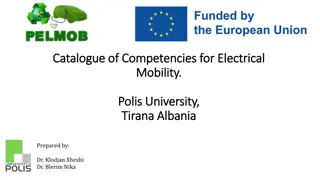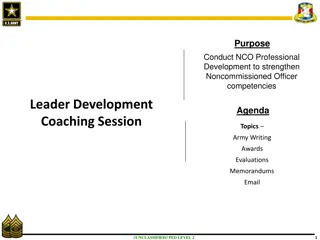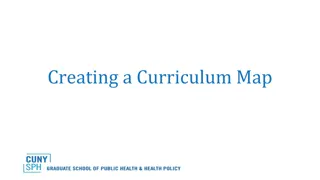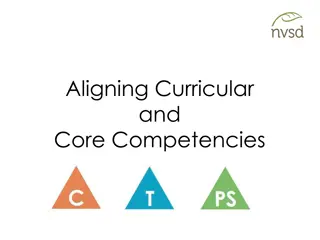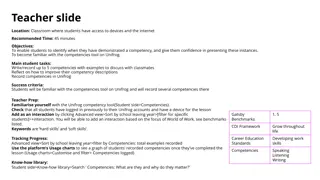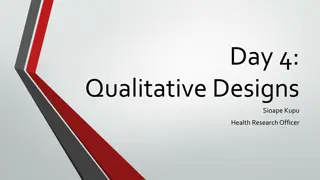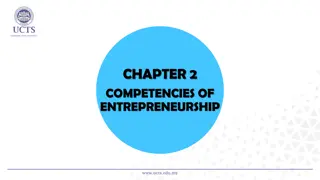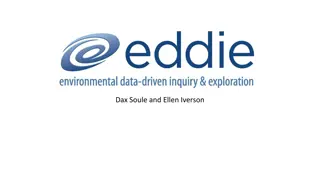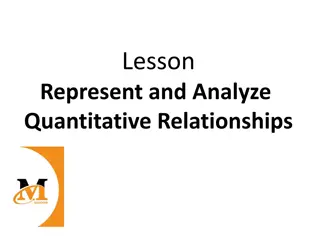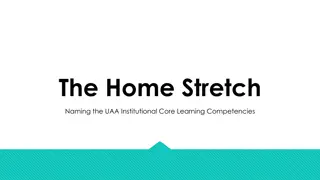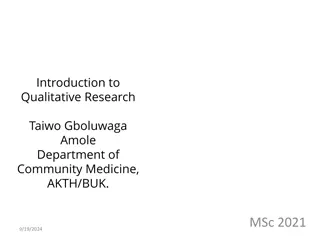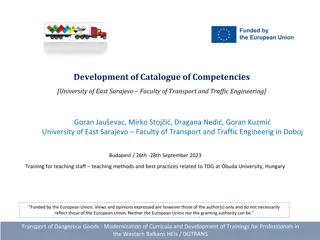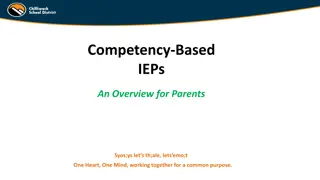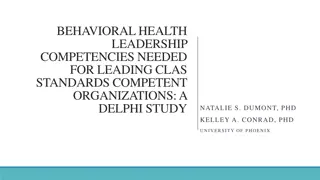English Language Competencies and Performance Indicators for Class Nine Students
Explore the five competencies and 21 performance indicators in the English curriculum for Class Nine students. From distinguishing facts and opinions to analyzing tonality and identifying genre structures, students will develop critical language skills to evaluate textual content effectively.
0 views • 11 slides
Competencies and Scope of Practice for Registered Nurses in New Zealand
The Competencies and Scope of Practice for Registered Nurses in New Zealand focus on regulating nursing practice to ensure public safety. Registered Nurses are expected to utilize nursing knowledge and judgment to assess health needs, provide care, and support individuals in managing their health. T
4 views • 25 slides
Overview of Research Process and Quantitative Research Phases
The research process involves steps like identifying, locating, assessing, and analyzing the research question to find answers. It includes quantitative and qualitative approaches, with specific phases like conceptual, design, empirical, analytic, and disseminating phases in quantitative research. E
9 views • 27 slides
Understanding Quantitative and Qualitative Research Methods
Exploring the differences between quantitative and qualitative research methods, this content delves into the importance of qualitative research, various methodologies such as focus groups and interviews, data collection, research ethics, and analysis techniques. It also covers the elements of the r
4 views • 43 slides
Competencies for Electrical Mobility at Polis University, Tirana, Albania
This catalogue outlines the competencies required for electrical mobility, focusing on three key areas: Intrapersonal competence, Engineering competence, and Interpersonal competence. It emphasizes adaptability, self-management, resilience, and lifelong learning as essential qualities for success in
0 views • 19 slides
Challenges and Solutions in Implementing Historical Competencies in Teaching
Explore the complexities and obstacles faced in implementing historical competencies in teaching, as discussed by Jens Aage Poulsen, a senior lecturer and researcher at HistoryLab, University College Lillebaelt, Denmark. The content delves into competence-based curriculum, core historical competenci
0 views • 7 slides
Enhancing NCO Competencies through Professional Development Coaching
Strengthen NCO competencies through focused coaching sessions covering topics like Army writing, awards, evaluations, and memorandums. Explore the NCOER counseling process, evaluation reporting systems, and standards for meeting or exceeding Army leader competencies. Enhance leadership skills and ca
0 views • 35 slides
Creating a Curriculum Map for Competency-Based Education
This presentation aims to guide faculty and staff in competency-based curriculum mapping at the program level. It covers the definition of curriculum mapping, a recommended framework, steps for identifying program competencies, developing a matrix, and mapping courses to competencies. Utilize this r
0 views • 11 slides
Understanding Agile Coaching Competencies and Growth Wheel
Explore the detailed Agile Coaching Growth Wheel, assessing competency areas like Self-Mastery, Serving the Business, Team, Org Change, and more. Dive into competencies such as Coaching, Leading, and Facilitating, crucial for guiding sustainable change and developing individuals and teams. Enhance y
0 views • 12 slides
Objective Structured Clinical Examination (OSCE): A Modern Approach to Assessing Clinical Competence
The Objective Structured Clinical Examination (OSCE) is a modern examination method widely used in the field of health science to evaluate clinical skill performance. It involves stations where medical students interact with simulated patients to demonstrate competencies such as history taking, phys
1 views • 40 slides
Understanding Patient Navigation in Oncology: Key Concepts and Competencies
Providing an overview of patient navigation in oncology, this educational material covers social determinants of health, patient navigation history, core competencies, and models in the field. Supported by the CDC, it discusses disparities in healthcare access and the impact on medically underserved
0 views • 37 slides
Communication and Collaboration Competencies in Curriculum Alignment
Explore the importance of communication and collaboration competencies in aligning curricular objectives. Sample I Can statements for K-4 students highlight the skills of asking questions, active listening, presenting information, collaborating with others, and reflecting on experiences. The content
1 views • 26 slides
UAA Core Competencies: Fostering Student Learning and Success
Explore the essential competencies at the University of Alaska Anchorage (UAA) that aim to promote student learning, alignment of experiences, academic confidence, and a sense of belonging on campus. Learn about the journey of identifying and streamlining core competencies, including effective commu
0 views • 16 slides
Focusing on Student Learning and Success in Higher Education
NWCCU emphasizes the importance of student learning outcomes and core competencies across programs to ensure student success. The institution engages stakeholders to develop meaningful, assessable, and aspirational core competencies relevant to students and communities. Through collaborative efforts
0 views • 9 slides
Understanding Competencies and Unifrog Tool for Student Development
This educational session focuses on helping students identify and present competencies confidently, using the Unifrog tool. Students will learn to recognize their competencies, discuss examples with peers, and reflect on improving their descriptions. The session covers the 12 Unifrog competencies, s
1 views • 13 slides
Contrasting Qualitative and Quantitative Traits in Genetics
Genetic traits in organisms can be qualitative or quantitative, with qualitative traits controlled by single genes and showing distinct variations, while quantitative traits are influenced by multiple genes and environmental factors, resulting in continuous variations. Qualitative genetics focuses o
0 views • 13 slides
Understanding Quantitative Research Design in Social Science
This content covers various aspects of quantitative research design, including descriptive and correlational studies, research design blueprint, robust research design considerations, and different types of research approaches. It emphasizes the characteristics, techniques, and terminologies associa
0 views • 24 slides
Understanding Quantitative Analysis for Decision Making in Management
Quantitative analysis is a crucial scientific approach for managerial decision-making, involving data manipulation to derive valuable information. This method encompasses problem definition, model development, and acquiring input data. Mathematical models, variables, and parameters play key roles in
0 views • 11 slides
Qualitative vs. Quantitative Approaches in Health Research
Exploring the different methodologies, paradigms, and methods used in health research, this content highlights the distinction between qualitative and quantitative designs. It covers research questions, aims, objectives, hypotheses, and various quantitative approaches such as experimental and observ
1 views • 28 slides
Understanding Quantitative Genetics Principles in Animal Breeding
Quantitative genetics focuses on the inheritance of characteristics based on degree rather than kind, compared to qualitative genetics. It involves polygenes controlling quantitative traits, which exhibit continuous variation and can be measured using metric units. Qualitative traits, on the other h
0 views • 22 slides
Development of EM Laboratories and Competencies in Higher Education Programs
This project, funded by the European Commission, focuses on setting up EM laboratories and defining specific competencies and learning outcomes in the field of Electrical Mobility. It involves the development of curricula, procurement of necessary equipment, and preparation of a catalog of competenc
0 views • 6 slides
Acupuncture Profession Challenges and Competencies Assessment
The content discusses the challenges faced by the acupuncture profession in terms of income and authority compared to mainstream health professions. It emphasizes the importance of developing competencies, knowledge, skills, and abilities (KSAs) to achieve professional status and align with other we
0 views • 42 slides
Understanding Quantitative Research in Social Studies: A Comprehensive Overview
An in-depth exploration of quantitative research methods in social studies, covering concepts, data analysis, survey techniques, causality identification, and setting up research projects. Emphasizes the importance of grasping strengths, pitfalls, and key points in quantitative research and understa
0 views • 51 slides
Understanding Entrepreneurial Competencies and their Impact
Entrepreneurial competencies are crucial skills possessed by successful entrepreneurs for effective performance. McClelland and McBer identified key competencies like initiative, systematic planning, problem-solving, and more. Entrepreneurship impacts a nation by providing leadership in industrial d
0 views • 22 slides
Project EDDIE: Enhancing Student Quantitative Reasoning with Large Datasets
Project EDDIE focuses on improving student quantitative reasoning through inquiry-driven exploration of complex datasets. The project aims to support instructors in guiding students to enhance their understanding of scientific concepts and quantitative skills. With a commitment to community and lear
0 views • 6 slides
Understanding and Representing Quantitative Relationships
Explore how to represent and analyze quantitative relationships using graphs, tables, and equations. Practice with unit rates, plotting points in a coordinate plane, and understanding independent and dependent variables. Develop skills in creating equations, tables, and graphs to model relationships
0 views • 120 slides
PSO Court Services Competencies: Knowledge and Skills for Pretrial Services Agency
This content outlines the competencies required for Pretrial Services Officers (PSOs) in Court Services, focusing on knowledge of diagnostic systems, regulatory requirements, organizational protocols, mental health conditions, and more. It details the expectations, skills, and competencies PSOs need
0 views • 16 slides
Enhancing One Health Leadership Skills and Competencies for Emerging Pandemic Threats
This collection of images and competency matrix highlights the essential skills and competencies required for effective leadership in One Health, particularly in the context of the Emerging Pandemic Threats Program. It emphasizes the importance of predicting, responding to, preventing, and identifyi
0 views • 7 slides
Naming the UAA Institutional Core Learning Competencies
In 2020, NWCCU standards mandated identifying and assessing UAA institutional core competencies for student learning. Through stakeholder engagement, 31 competencies were narrowed down to 4 basic ones. The process now focuses on developing specific names for these core student learning competencies,
0 views • 13 slides
Understanding Research Methods in Public Health
Exploring the nuances of qualitative and quantitative research methods in the context of public health, this content delves into how each approach offers unique insights and perspectives. It discusses the importance of qualitative research in uncovering underlying factors influencing health, interpr
0 views • 77 slides
Modernizing Competencies in Transport and Traffic Engineering Curriculum
The University of East Sarajevo Faculty of Transport and Traffic Engineering is embarking on the modernization of its curriculum by updating existing subjects and emphasizing competencies related to the transport of dangerous goods. This initiative includes training for teaching staff and developing
0 views • 10 slides
Pretrial Services Agency Competencies in Treatment: Knowledge and Skills Assessment
This content outlines the competencies required in the area of treatment by pretrial services agencies. It focuses on the knowledge and skills related to substance-related treatment, mental health disorders, supervision procedures, treatment programs, regulatory knowledge, HISP monitoring policies,
0 views • 22 slides
Pretrial Services Agency Competencies for Program Directors
Competencies for Program Directors and Deputy Program Directors include leveraging human capital resources, building relationships, providing customer service, effective communication, delivering quality results, taking initiative, strategic planning, problem-solving, technical expertise, and adapta
0 views • 16 slides
Enhancing Competencies for Professional Development
Explore the concept of competencies in professional development, learn how to self-assess critical competencies for your role, create a personalized development plan, and understand the importance of leveraging strengths while improving areas of growth. Discover the Iceberg Model, competency framewo
0 views • 11 slides
Quantitative Research Framework for Historical Disciplines
Scholarly communities in historical disciplines are combining quantitative and qualitative methods to study phenomena that change over time. The proposed general methodological reflection aims to enhance research in historical linguistics through quantitatively driven models and claims. Quantitative
0 views • 18 slides
Understanding Competency-Based IEPs and Core Competencies for Parents
This overview explores Competency-Based IEPs, focusing on strengths, interests, and goals while involving parents, teachers, and students. It emphasizes aligning with peer curriculum, using authentic assessment, and being responsive to student needs. Core competencies such as communication, critical
0 views • 23 slides
Understanding UV-Visible Spectrophotometry for Quantitative Analysis
Spectrometry in quantitative analysis involves determining substance concentration through spectrophotometry. UV-Visible Spectrophotometry measures light absorption in the UV or visible region using the Beer-Lambert Law, relating absorbance to substance concentration. The electromagnetic spectrum en
0 views • 15 slides
Empowering Through Quantitative Literacy: A Roadmap to Mathematical Empowerment
In a modern society filled with data and statistics, quantitative literacy is essential for individuals to think critically, question authority, and make informed decisions. The ability to understand and engage with mathematical concepts is crucial for addressing complex issues and thriving in today
0 views • 15 slides
Understanding Quantitative Data Analysis in Research
Dive into the world of quantitative data analysis with a focus on frequencies, central tendency, dispersion, and standard deviation. Explore the collection and analysis of numerical data, levels of measurement, and methods for quantifying social concepts. Learn about the importance of capturing data
0 views • 25 slides
Core Leadership Competencies in Behavioral Health for CLAS Standards Competent Organizations
Health disparities in healthcare and mental health organizations are linked to the failure to implement CLAS Standards. This study identifies core leadership competencies required for executive behavioral health leaders to effectively lead CLAS Standards competent organizations. The Delphi study aim
0 views • 17 slides




